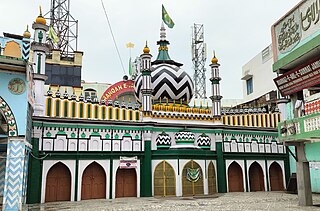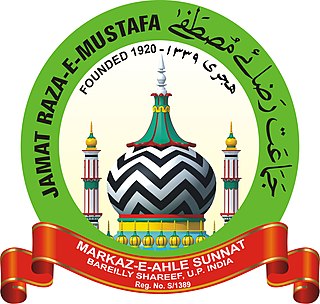Related Research Articles
In Islam, sunnah, also spelled sunna, are the traditions and practices of the Islamic prophet Muhammad that constitute a model for Muslims to follow. The sunnah is what all the Muslims of Muhammad's time supposedly saw and followed and passed on to the next generations. According to classical Islamic theories, the sunnah are documented by hadith, and alongside the Quran are the divine revelation (wahy) delivered through Muhammad that make up the primary sources of Islamic law and belief/theology. Differing from Sunni classical Islamic theories are those of Shia Muslims, who hold that Imams interpret the sunnah, and Sufi who hold that Muhammad transmitted the values of sunnah "through a series of Sufi teachers".

Sunni Islam is the largest branch of Islam, followed by 85–90% of the world's Muslims, and simultaneously the largest religious denomination in the world. Its name comes from the word Sunnah, referring to the tradition of Muhammad. The differences between Sunni and Shia Muslims arose from a disagreement over the succession to Muhammad and subsequently acquired broader political significance, as well as theological and juridical dimensions. According to Sunni traditions, Muhammad left no successor and the participants of the Saqifah event appointed Abu Bakr as the next-in-line. This contrasts with the Shia view, which holds that Muhammad appointed his son-in-law and cousin Ali ibn Abi Talib as his successor.

Jamaat-e-Islami, or Jamaat as it is commonly known, is an Islamist political party based in Pakistan and founded by Abul Ala Maududi. It is the Pakistani successor to Jamaat-e-Islami, which was founded in colonial India in 1941. Its objective is the transformation of Pakistan into an Islamic state, governed by Sharia law, through a gradual legal, and political process. JI strongly opposes capitalism, communism, liberalism, and secularism as well as economic practices such as offering bank interest. JI is a 'vanguard party', whose members are intended to be leaders spreading party beliefs and influence. Supporters not thought qualified to be members may become 'affiliates', and beneath them are 'sympathizers'. The party leader is called an 'ameer'. Although it does not have a large popular following, the party is quite influential and considered one of the major Islamic movements in Pakistan, along with Deobandi and Barelvi.

The Barelvi movement, also known as Ahl al-Sunnah wal-Jama'ah is a Sunni revivalist movement that generally adheres to the Hanafi and Shafi'i schools of jurisprudence, and Maturidi and Ash'ari schools of theology with hundreds of millions of followers, and it encompasses a variety of Sufi orders, including the Chistis, Qadiris, Suhrawardis and Naqshbandis as well as many other orders of Sufism. They consider themselves to be the continuation of Sunni Islamic orthodoxy before the rise of Salafism and Deobandi movement.

The Sipah-e-Sahaba (SS), also known as the Millat-e-Islamiyya (MI), is a Anti-Shia Sunni Islamist banned Deobandi organisation in Pakistan. Founded by Pakistani cleric Haq Nawaz Jhangvi in 1989 after breaking away from Sunni Deobandi party Jamiat Ulema-e-Islam (F), it was based in Jhang, Punjab, but had offices in all of Pakistan's provinces and territories. It operated as a federal and provincial political party until it was banned and outlawed as a terrorist organization by Pakistani president Pervez Musharraf in 2002. Even though it has been banned by the Pakistani government on numerous occasions, the Sipah-e-Sahaba has continued to operate under a different name throughout the country; it has significant underground support in Punjab and Khyber Pakhtunkhwa. The organization was also banned by the United Kingdom, where there is a significant Pakistani diaspora population, in 2001.

The Jamaat-e-Islami Kashmir or Jamaat-e-Islami Jammu and Kashmir (JIJK) is an Islamic political party based in the city of Srinagar in the Indian administered territory of Jammu and Kashmir. It is distinct from the Jamaat-e-Islami Hind. The organisation's stated position on the Kashmir conflict is that Kashmir is a disputed territory and the issue must be sorted as per UN or through tripartite talks between India, Pakistan and representatives of Kashmir.
Jamaat-e-Islami is an Islamist fundamentalist movement founded in 1941 in British India by the Islamist author, theorist, and socio-political philosopher, Syed Abul Ala Maududi, who was inspired by the Muslim Brotherhood. It is considered one of the most influential Islamist organisations, and was the first to develop an ideology based on the modern revolutionary conception of Islam. Its founding branch in Pakistan is the nation's largest fundamentalist party.
Jamaat Ahle Sunnat is a Muslim religious organization in Pakistan that represents the Barelvi movement. It is supported by Mashaikh including all spiritual centers. As a Sunni organisation it has adopted many Sufi customs and traditions. Jamaat e Ahle Sunnat is a representative of sunni(sufi) nation of Pakistan. It works under the superivision of spiritual centers including Golra Sharif, Sial Sharif, Pakpattan Sharif, AliPur Syedan Sharif and others. Pir of Golra Sharif is the current pattern in chief of the organization.
The Chhaparband are a Muslim community found in the states of Karnataka and Maharashtra in India. They are Muslim converts from the Chhaparband community.

Ghousavi Shah is a Muslim Sufi Mystic Teacher, Writer and Columnist said to be famous as a great humanist in south India.
The Difa-e-Pakistan Council is an umbrella coalition of more than 40 Pakistani Political and Religious parties that advocated conservative policies such as closing NATO supply routes to Afghanistan and rejects granting India most-favored nation status.
Sahibzada Haji Muhammad Fazal Karim was a Pakistani religious leader and politician who belonged to an intellectual and spiritual family of Islamic scholars. He was a senior and the most vocal member of Pakistan Muslim League (N), from which he separated later on, for not adopting a principled stand against terrorism. He was elected as founder General Secretary of Jamat e Ahle Sunnat Pakistan in 1978 and later served as Senior Vice President of Jamiat Ulema-e-Pakistan (JUP). He was elected from Faisalabad, twice as a member of the Provincial Assembly and Twice as Member of National Assembly from 1993 to 2013. He also served as Minister for Auqaf and Religious Affairs as well as Chairman Muttahida Ulema Board Punjab. He was also the Founder Chairman of the Sunni Ittehad Council, which is an amalgamation of several Barelivi parties across the globe. Suffering from liver cancer, he was hospitalised in Faisalabad in critical condition on April 4, 2013, and died on 15 April 2013.

Mustafa Raza Khan Qadri (1892–1981), was an Indian Sunni Muslim scholar and author, and leader of the Sunni Barelvi movement following the death of its founder, his father Ahmed Raza Khan. He was known as Mufti-Azam-i-Hind to his followers. He is widely known as Mufti-e-Azam-e-Hind. On his death date his follower celebrate Urs name as Urs-e-Noori on every 14th Muharram of Islamic Year.

Pir Syed Jamaat Ali Shah was a Pakistani author, Islamic scholar and Sufi saint of the Naqshbandi Order. He presided over the All India Sunni Conference and led the Movement for Shaheed Ganj Mosque. He was a contemporary of Ahmed Raza Khan Barelvi, the founder of Barelvi movement.

All India Sunni Conference was an organization of Indian Sunni Muslims associated with Sufism and this Conference became the voice of Barelvi movement in British India. The Conference was established in 1925 in the wake of Congress led secular Indian nationalism, changing Geo-political situation of India by leading Barelvi personalities of that time including Jamaat Ali Shah, Naeem-ud-Deen Muradabadi, Mustafa Raza Khan Qadri, Amjad Ali Aazmi, Abdul Hamid Qadri Badayuni, Mohammad Abdul Ghafoor Hazarvi and Syed Faiz-ul Hassan Shah among others.

Sayed Mohiuddin Hussaini Peerzade, also known as Sayed Tanveer Hashmi, is a Sufi leader and spiritual master From Bijapur Sharif, a Sufi shrine in Karnataka, India. Tanveer Hashmi is a patron of various academic, social, and other activities of Sufi Sunni Muslims in India. He belong to Hussiani Hashmi Family, the family of Ahle Bait. His official name in Shajra Shareef is Syed Mohiuddin Hussaini Hashmi Al-Qadri.
The 2016 conference on Sunni Islam in Grozny was convened to define the term "Ahl al-Sunnah wa al-Jama'ah", i.e. who are "the people of Sunnah and majority Muslim community", and oppose Takfiri groups. The conference was held in the Chechen Republic capital of Grozny from 25 to 27 August 2016, sponsored by the president of Chechnya, Ramzan Kadyrov, and attended by approximately 200 Muslim scholars from 30 countries, especially from Russia, Egypt, Syria, Libya, Kuwait, Sudan, Jordan, etc. at the invitation of Yemeni Sufi preacher, Ali al-Jifri.

Shakir Ali Noorie is an Indian Sunni Muslim scholar, preacher and current President of Sunni Dawate Islami, a non-political, religious organisation in Mumbai, India. He adheres to the principles of Ahle Sunnat wa Jamaat (Barelvi) ideology.

Jamat Raza-e-Mustafa also known as JRM, is a historical organisation of Indian Sunni Barelvi Muslims associated with Sufism. It was founded by scholar and 19th-century Mujadid Ahmed Raza Khan Barelvi on 17 December 1920 in Bareilly, India, to propagate Islamic teachings in accordance with Ahle Sunnah wal Jama'ah. The self-described aim of the group is to "deny misguided sects and safeguard the beliefs (Aqaa'id) of the Ahle Sunnah wal Jama'ah."
Jamaat-ul-Muslimeen, literally translated as "Group or party of Muslims", is a Pakistani religious organization. Based in Karachi, Sindh, Pakistan, it was founded by Masood Ahmad in January 1962. The present leader of the organization is Muhammad Ishtiaq who became the ameer after the death of Masood Ahmed in 1997.
References
- ↑ Online, The Milli Gazette (29 August 2019). "Unanimous stand of Indian Muslim Organisations on Kashmir". milligazette.com.
- ↑ "Intro". Jamat E Ahle Sunnat. 10 September 2019.
- ↑ "Shaheed E Azam Conference,Bijapur 2019". Jamat E Ahle Sunnat. 10 September 2019.
- ↑ "Muslim bodies question way of abrogating Article 370 provisions". businesstoday.in. 28 August 2019.
- ↑ "THE WEEK". The Week.
- ↑ "Muslim bodies question way of abrogating Article 370 provisions". outlookindia.com/.
- ↑ "Jamat E Ahle Sunnat Karnataka vs Union of India on 20 September, 2019". Indian Kanoon. Retrieved 7 October 2023.
- ↑ "Media News Koppal Me Jamate Ahle Sunnat Karnataka Ki Shakh Ka Qayam". Jamat E Ahle Sunnat. 6 August 2019.
- ↑ Rashtriya Sahara Urdu,Belgaum edition 27 July 2019 Page 4
- ↑ The Inquilab, 31 July 2019, Devanagari edition, page 7